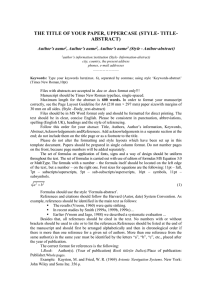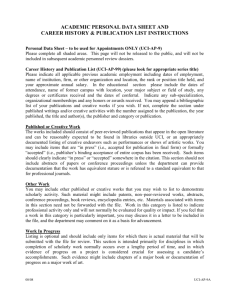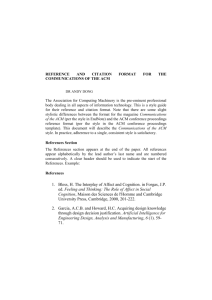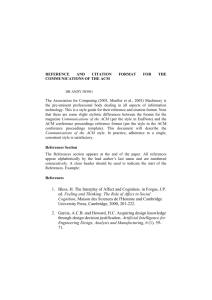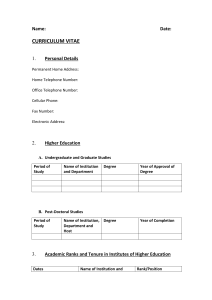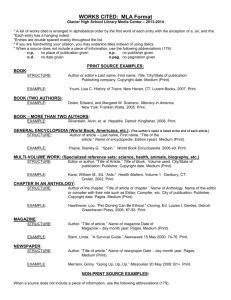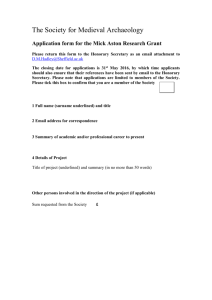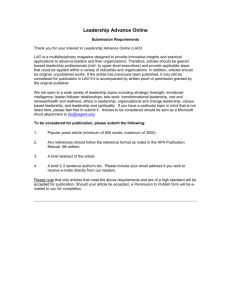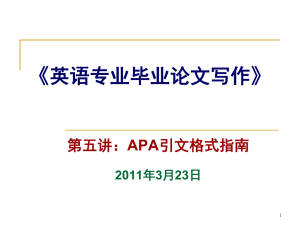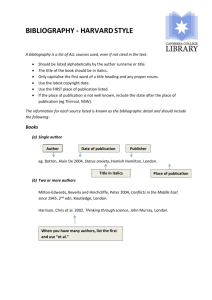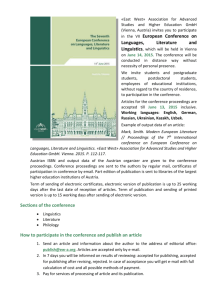Abstract Template ()
advertisement
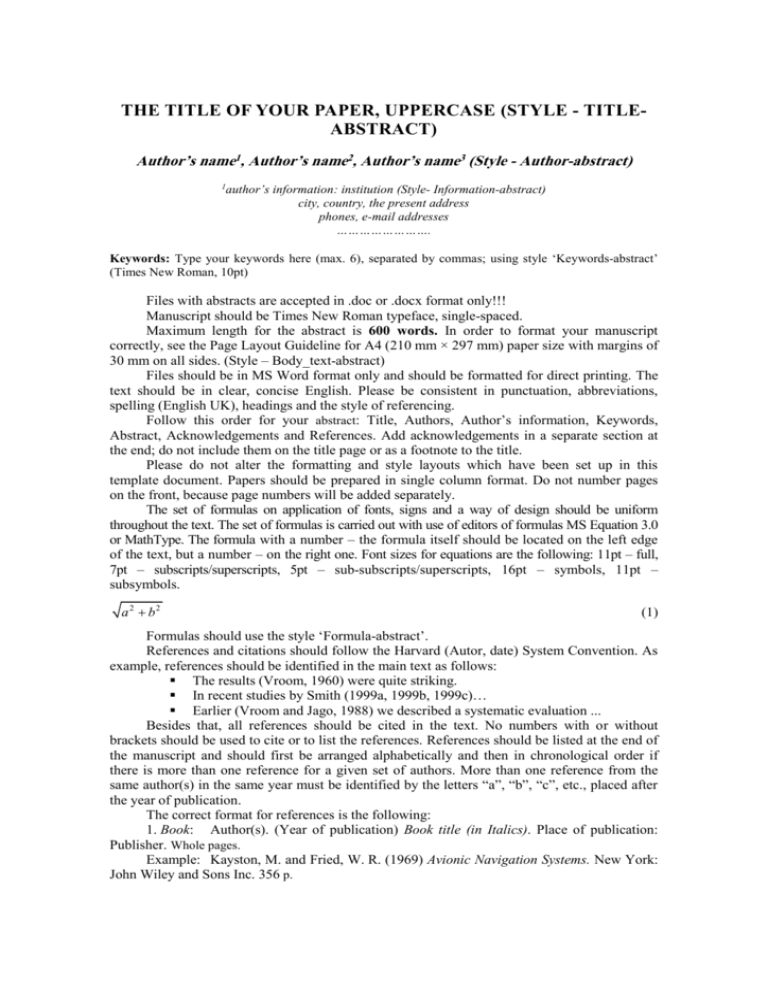
THE TITLE OF YOUR PAPER, UPPERCASE (STYLE - TITLEABSTRACT) Author’s name1, Author’s name2, Author’s name3 (Style - Author-abstract) author’s information: institution (Style- Information-abstract) city, country, the present address phones, e-mail addresses ……………………. 1 Keywords: Type your keywords here (max. 6), separated by commas; using style ‘Keywords-abstract’ (Times New Roman, 10pt) Files with abstracts are accepted in .doc or .docx format only!!! Manuscript should be Times New Roman typeface, single-spaced. Maximum length for the abstract is 600 words. In order to format your manuscript correctly, see the Page Layout Guideline for A4 (210 mm × 297 mm) paper size with margins of 30 mm on all sides. (Style – Body_text-abstract) Files should be in MS Word format only and should be formatted for direct printing. The text should be in clear, concise English. Please be consistent in punctuation, abbreviations, spelling (English UK), headings and the style of referencing. Follow this order for your abstract: Title, Authors, Author’s information, Keywords, Abstract, Acknowledgements and References. Add acknowledgements in a separate section at the end; do not include them on the title page or as a footnote to the title. Please do not alter the formatting and style layouts which have been set up in this template document. Papers should be prepared in single column format. Do not number pages on the front, because page numbers will be added separately. The set of formulas on application of fonts, signs and a way of design should be uniform throughout the text. The set of formulas is carried out with use of editors of formulas MS Equation 3.0 or MathType. The formula with a number – the formula itself should be located on the left edge of the text, but a number – on the right one. Font sizes for equations are the following: 11pt – full, 7pt – subscripts/superscripts, 5pt – sub-subscripts/superscripts, 16pt – symbols, 11pt – subsymbols. a2 b2 (1) Formulas should use the style ‘Formula-abstract’. References and citations should follow the Harvard (Autor, date) System Convention. As example, references should be identified in the main text as follows: The results (Vroom, 1960) were quite striking. In recent studies by Smith (1999a, 1999b, 1999c)… Earlier (Vroom and Jago, 1988) we described a systematic evaluation ... Besides that, all references should be cited in the text. No numbers with or without brackets should be used to cite or to list the references. References should be listed at the end of the manuscript and should first be arranged alphabetically and then in chronological order if there is more than one reference for a given set of authors. More than one reference from the same author(s) in the same year must be identified by the letters “a”, “b”, “c”, etc., placed after the year of publication. The correct format for references is the following: 1. Book: Author(s). (Year of publication) Book title (in Italics). Place of publication: Publisher. Whole pages. Example: Kayston, M. and Fried, W. R. (1969) Avionic Navigation Systems. New York: John Wiley and Sons Inc. 356 p. 2. Conference Proceedings: Author(s). (Year of publication) Title of an article. In: Proceedings (in italics); title of a conference, date and place of a conference. Place of publication: Publisher, pages Example: Gibson, E.J. (1977) The performance concept in building. In: Proceedings of the 7th CIB Triennial Congress, Edinburgh, September 1977. London: Construction Research International, pp. 129-136. 3. Journal article: Author(s). (Year of publication) Article title. Journal Title, Volume and issue number, inclusive pages. DOI. Example: Nikora, V. (2006) Hydrodynamics of aquatic ecosystems. Acta Geophysica, 55(1), 3–10. DOI:10.2478/s11600-006-0043-6. 4. Report: Author(s). (Year of publication) Title. Place of publication: Publisher. (Report number). Example: Osgood, D. W. and Wilson, J. K. (1990) Covariation of adolescent health problems. Lincoln: University of Nebraska. (NTIS No. PB 91-154 377/AS). 5. Government publication: Institution name. (Year of publication) Title. Place of publication: Publisher. Example: Ministerial Council on Drug Strategy. (1997) The national drug strategy: Mapping the future. Canberra: Australian Government Publishing Service. Acknowledgements (‘Heading_nonum-abstract’ style) The Acknowledgements and References headings should be in bold but without numbers, using the style ‘Heading_nonum-abstract’. Acknowledgements (if present) mention some specialists, grants and foundations connected with the presented paper. References (‘Heading_nonum-abstract’ style) 1. Gibson, E.J. (1977) The performance concept in building. In: Proceedings of the 7th CIB Triennial Congress, Edinburgh, September 1977. London: Construction Research International, pp. 129-136. 2. Kayston, M. and Fried, W. R. (1969) Avionic Navigation Systems. New York: John Wiley and Sons Inc. 3. Ministerial Council on Drug Strategy. (1997) The national drug strategy: Mapping the future. Canberra: Australian Government Publishing Service. 4. Nikora, V. (2006) Hydrodynamics of aquatic ecosystems. Acta Geophysica, 55(1), 3–10. DOI:10.2478/s11600-006-0043-6. 5. Osgood, D. W., and Wilson, J. K. (1990) Covariation of adolescent health problems. Lincoln: University of Nebraska. (NTIS No. PB 91-154 377/AS). The references style should be ‘References-abstract’ Times New Roman 11pt. Abstracts poorly produced or incorrectly formatted may not be included in the proceedings.
